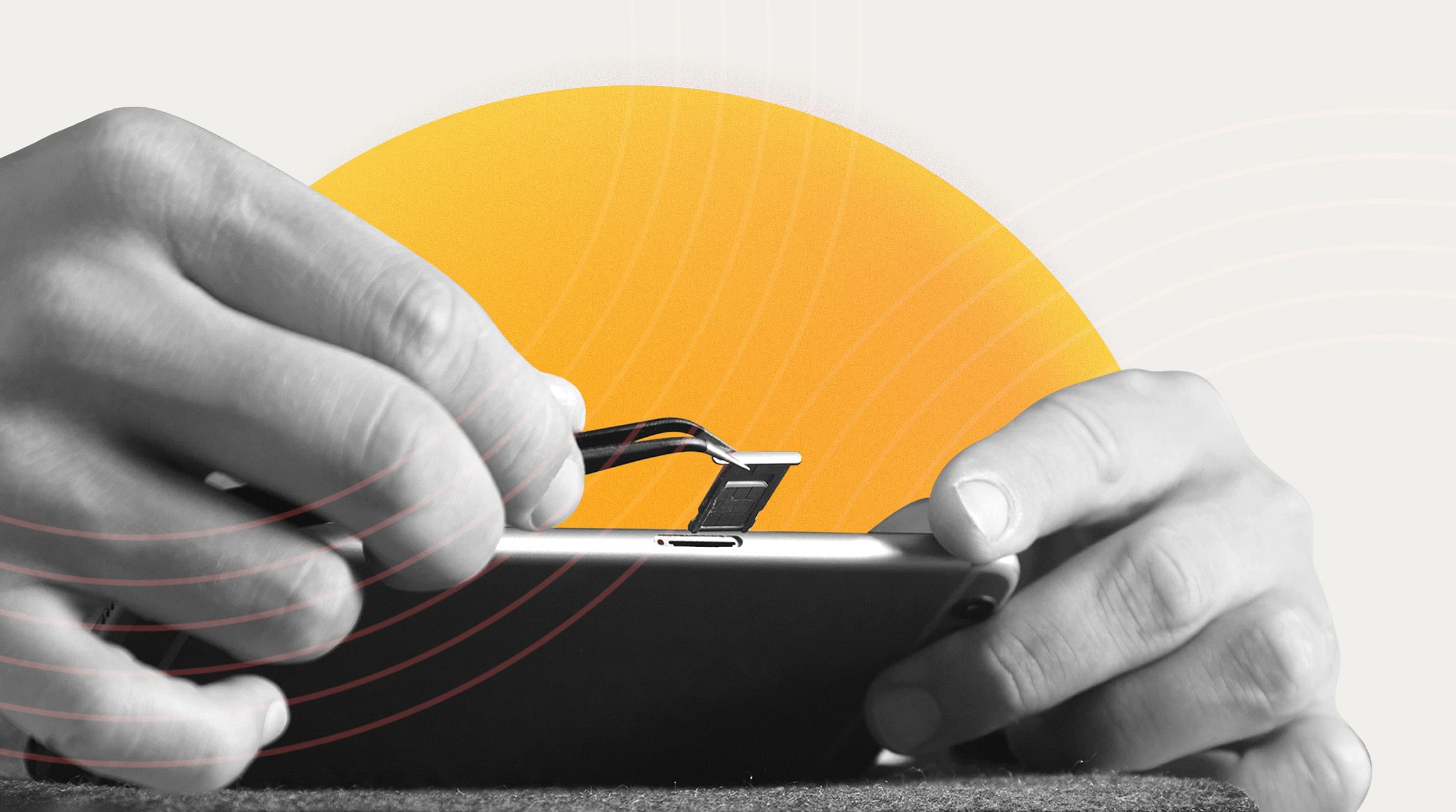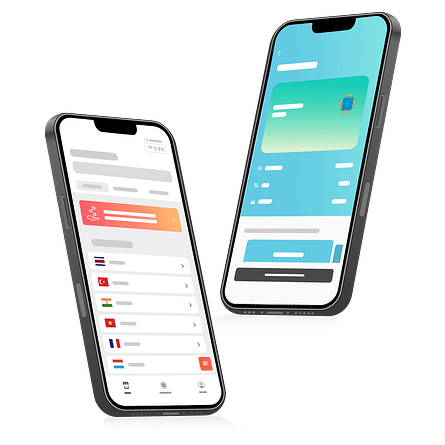
SIM cards — we’ve seen them, used them, and (tried) to keep track of them. But what do they do? And is there a better way to stay connected? Read on to explore the most common problems with SIM cards and why eSIMs are a great alternative.
What is a SIM Card?
SIMs (Subscriber Identity Modules) are tiny memory chips that store information about you as a mobile subscriber. They’re the traditional way your phone has connected to a mobile network, allowing you to call, text, and access data. While the size of each SIM will vary from phone to phone (e.g., the mini-SIM, micro-sim, nano-sim), each “new” SIM functions the same.
10 Problems With SIM Cards
There are many advantages to SIM cards, but they also have drawbacks. Here are the most common problems you might face if you stick with a traditional SIM.
1. Transferring a SIM Card
Today, SIM cards are usually compatible with one another and most devices. However, if your phone is of an older generation or from another region, SIM card size can vary. If that’s the case, you may need to purchase a special tray or SIM card reader to transfer your SIM to a new device. This incompatibility can be a roadblock if you’re traveling and need immediate coverage, don’t have access to an adaptor, or are in an emergency.
3. Switching Carriers
Switching mobile carriers can be straightforward or complicated, depending on whether your phone is locked or unlocked.
With an unlocked phone, you can simply remove the old SIM card from your device and insert a new one for the area you’re visiting. Once inserted, the SIM should connect to the new network, and you’re good to go. The only issue here is keeping track of both SIM cards.
If your phone is locked, you can’t switch to another carrier. A locked phone usually means you have an ongoing contract with your mobile network provider. While your phone is locked, you can only use the SIM your carrier provided.
3. SIM Card Malfunctions
We've all broken things in life — it happens! It’s no different for SIM cards. In fact, the risk of damaging a SIM is much higher for two reasons: Chips are extremely delicate and we use our phones a lot.
Mobile phones are subject to a fair bit of wear and tear. Leaving your phone near water and heat or simply dropping it can cause your SIM card to malfunction. The risk of damage increases while transferring your chip — it’s much easier to scratch a card than you might think!
4. Limited Wireless Service
SIM cards are only as good as the area they cover, and being in a remote location could compromise your signal strength. If you purchase a preloaded card from a vendor when you’re abroad, you could face unreliable build quality, inconsistent service, and hacked or compromised cards. Even something as simple as improperly placing a new card into the SIM tray could disrupt your service.
5. Expensive Roaming Plans
You could be charged a hefty premium for the service if you buy a roaming plan from your home provider. Some network providers offer roaming plans that cost $10-15 daily ($70-105 a week!), and few will allow you to tailor your plan depending on the services you need.
Here at Airalo, we offer comparable eSIM plans at more affordable rates — and you only pay for what you get. That sounds like a win-win to us!
6. Surprise Charges
If roaming charges weren’t enough, imagine coming home to a bill with hundreds of dollars in extra fees! Your network provider might not share that their roaming plan is for their approved networks only, which means you could face plenty of surprise charges if you accidentally connect to a different network while you’re away.
7. Finding SIM Card Vendors While Travelling
You’ve made it abroad with your phone intact. Now, it’s time to find a local SIM card. Finding a reputable vendor can be tricky — especially when you’re in a new country, trying to speak a new language, and struggling with jet lag.
You can avoid the hassle of sourcing a SIM card by downloading an eSIM before you leave. You’ll be able to connect to data within minutes of arrival at your destination, giving you more time to check in with loved ones, get to your hotel, and catch up on some much-needed Zzzs.
8. Keeping Track of Multiple SIM Cards
On the plus side, SIM cards have become smaller and more efficient. On the downside, they’ve become much smaller and easier to lose.
If you remove your SIM and replace it with another while traveling, you’ll have to keep track of it. If you’re visiting multiple countries, that means labeling and organizing SIM cards for each one. Unless you’ve developed a seriously sophisticated filing system (kudos!), that’s a lot to manage while you’re on the go.
9. Finding a SIM Key When You Need It
Speaking of losing things, do you have a SIM key handy? Not to worry — they tend to go missing! A SIM key is the (very) small tool you use to open your SIM tray. When you open a new phone package, the SIM key is easy to miss and isn’t something you’d typically have on hand, especially when traveling.
It is worth noting that you can use a toothpick or paperclip as an alternative to jimmy the tray open. However, you’ll risk damaging/scratching your phone or your SIM card.
10. Replacing a SIM Card
Because SIM cards are physical, replacing one takes time. You’ll either need to find a local vendor to get a new card or wait for your service provider to send you one — all without access to call, text, or data services. Yikes!
The eSIM Solution
Don’t get us wrong — SIM cards have many advantages. However, technology has evolved, making more affordable and efficient options available.
An eSIM is embedded directly into your mobile device. To connect to the internet, you can download a data pack and be up and running within a few minutes. That means no more:
- Finding SIM vendors
- Managing SIM cards
- Damaging SIM cards
- Buying expensive roaming plans
Allowing you to:
- Save precious time
- Choose a more affordable option
- Save multiple eSIM profiles to your device
Ready to go digital? Try your first eSIM today!


